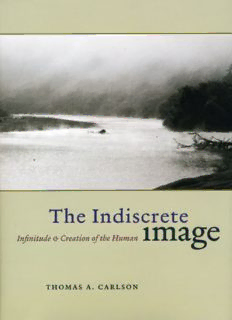
The indiscrete image : infinitude & creation of the human PDF
Preview The indiscrete image : infinitude & creation of the human
the indiscrete image religion and postmodernism A series edited by Thomas A. Carlson Editorial Board Gil Anidjar, Arnold Davidson, Hent de Vries, Amy Hollywood, Eric L. Santner Founding Editor Mark C. Taylor recent books in the series Mustapha Cherif, Islam and the West: A Conversation with Jacques Derrida (2008) Jacques Derrida, The Gift of Death, Second Edition, and Literature in Secret (2008) Ward Blanton, Displacing Christian Origins: Philosophy, Secularity, and the New Testament (2007) Mark C. Taylor, After God (2007) Slavoj Žižek, Eric L. Santner, and Kenneth Reinhard, The Neighbor: Three Inquiries in Political Theology (2006) Vincent P. Pecora, Secularization and Cultural Criticism: Religion, Nation, and Modernity (2006) Paolo Apolito, The Internet and the Madonna: Religious Visionary Experience on the Web (2005) Kevin Hart, The Dark Gaze: Maurice Blanchot and the Sacred (2004) G the indiscrete image Infi nitude & Creation of the Human thomas a. carlson the university of chicago press chicago and london thomas a. carlson is professor of religious studies at the University of California, Santa Barbara. He is the translator of three works by Jean- Luc Marion, most recently of The Idol and Distance (2001), and the author of Indiscretion: Finitude and the Naming of God (1999), the latter published by the University of Chicago Press. The University of Chicago Press, Chicago 60637 The University of Chicago Press, Ltd., London © 2008 by The University of Chicago All rights reserved. Published 2008 Printed in the United States of America 17 16 15 14 13 12 11 10 09 08 1 2 3 4 5 isbn-13: 978-0-226-09315-4 (cloth) isbn-10: 0-226-09315-8 (cloth) Library of Congress Cataloging-in-Publication Data Carlson, Thomas A. The indiscrete image : infi nitude and creation of the human / Thomas A. Carlson. p. cm.—(Religion and postmodernism) Includes bibliographical references and index. isbn-13: 978-0-226-09315-4 (cloth : alk. paper) isbn-10: 0-226-09315-8 (cloth : alk. paper) 1. Theological anthropology— Christianity. 2. Philosophical anthropology. 3. Negative theology. 4. Postmodernism—Religious aspects—Christianity. 5. Heidegger, Martin, 1889–1976. 6. Technology—Religious aspects—Christianity. I. Title. bt701.3.c37 2008 218—dc22 2007052550 o The paper used in this publication meets the minimum requirements of the American National Standard for Information Sciences—Permanence of Paper for Printed Library Materials, ansi z39.48-1992. G for ashley turman tidey Der Mensch ist jenes Nicht-b leiben- können und doch nicht von der Stelle Können. Entwerfend wirft das Da-s ein in ihm ihn ständig in die Möglich- keiten und hält ihn so dem Wirklichen unterworfen. So geworfen im Wurf is der Mensch ein Übergang, Übergang als Grundwesen des Geschehens. Der Mensch ist Geschichte, oder besser, die Geschichte ist der Mensch. Der Mensch ist im Übergang entrückt und daher wesenhaft “abwesend.” Abwesend im grundsätzlichen Sinne—nicht und nie vorhanden, sondern abwesend, indem er weg- west in die Gewesenheit und in die Zukunft, ab- wesend und nie vorhanden, aber in der Ab-w esenheit existent. Versetzt ins Mögliche, muß er ständig versehenseins des Wirklichen. Und nur weil so versehen und versetzt, kann er sich entsetzen. Und nur, wo die Gefährlick- eit des entsetzens, da die Seligkeit des Staunens—jene wache Hingerissen- heit, die der Odem alles Philosophierens ist. Igitur hominem accepit indiscretae opus imaginis . . . Man is that inability to remain and is yet unable to leave his place. In pro- jecting, the Da- sein in him constantly throws him into possibilities and thereby keeps him subjected to what is actual. Thus thrown in this throw, man is a transition, transition as the fundamental essence of occurrence. Man is history, or better, history is man. Man is enraptured in this transi- tion and therefore essentially “absent.” Absent in a fundamental sense— never simply at hand, but absent in his essence, in his essentially being away, removed into essential having been and future, essentially absencing and never at hand, yet existent in his essential absence. Transposed into the possible, he must constantly be in oversight of what is actual. And only because he is thus in oversight and transposed can he be unsettled. And only where there is the danger of being unsettled do we fi nd the bliss of astonishment—being torn away in that wakeful manner that is the breath of all philosophizing. —Martin Heidegger, The Fundamental Concepts of Metaphysics: World, Finitude, Solitude He therefore accepted man as the work of an indiscrete image . . . —Giovanni Pico della Mirandola, Oration G contents Acknowledgments xi Opening 1 1 Of God or a Salamander: The Creative Human as Indiscrete Image 5 2 “I am”: Technological Modernity, Theological Tradition, and the Human in Question 36 3 The Living Image: Infi nitude, Unknowing, and Creative Capacity in Mystical Anthropology 74 4 Of the Indefi nite Human: Religion and the Nature of Technological Culture 118 5 Here Comes Everybody: Technopoetics and Mystical Tradition in Joyce 149 6 To Inherit: The Birth of Possible Worlds 185 Closing 206 Bibliography 217 Index 233 ix
Description: